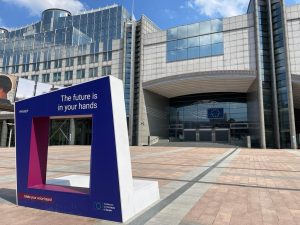-
|
10 January 2024
|Posteado en : Interview
Spanish Justice experts explain how EU-funded cooperation projects in Albania, Bosnia-Herzegovina and Serbia are helping them join the EU club
2024 marks the 20th anniversary of the largest ever accession of countries to the European Union. On 1 May 2004, ten new countries joined the EU club: the islands of Cyprus and Malta along with eight Central and Eastern European countries, ending the post-World War II division of Europe. Over the years, more countries have joined the EU’s borders, although the integration processes are slow and complex, requiring many structural changes in the countries’ societies in order to meet the strict conditions set by the Union as a prerequisite for membership.
With this enlargement policy, the EU seeks to unify European countries around a common political and economic project, while at the same time strengthening its presence on the international stage. However, both sides stand to gain from this process. For the candidate countries, according to EU sources, “enlargements have proved to be one of the most effective tools in promoting political, economic and social reforms, as well as in consolidating peace, stability and democracy across the continent”.
To speed up this process, the EU funds technical cooperation projects in which European specialists exchange their knowledge and experience with specialists from the candidate countries in areas such as security – to fight organised crime gangs, for example – or justice – to curb corruption, among others. In the following lines, we bring together the testimonies of three specialists from Spanish justice institutions who are participating in cooperation projects in Albania, Bosnia and Serbia. They tell us about the historical and social context of these countries, the benefits of accession and the complex processes that are being supported through European projects.
Why are countries like Bosnia, Albania and Serbia interested in joining the EU?
“In the case of Bosnia and Herzegovina, it is a way to set a path towards stability in the area and to overcome the war of the 1990s and put itself on an equal footing with Croatia, which was also part of the former Yugoslavia and is already integrated into the EU. At the same time, it is a way to neutralise the influence of Islamic countries, at least the most radical ones, with respect to the country”, responds Jorge Obach, magistrate of the General Council of the Judiciary (CGPJ) and head of the European project EU4Justice-Bosnia, which supports the fight against organised crime and corruption in Bosnia and Herzegovina (BiH).
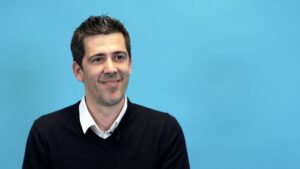
Álvaro García, Spanish prosecutor mobilised in the framework of the EU4JUSTICE-Albania project Álvaro García, provincial prosecutor of Córdoba, and Arturo Valdés, magistrate of the CGPJ, both experts mobilised by the FIIAPP in the framework of the European project EU4Justice-Albania, for the improvement of the capacity of independent judicial institutions in Albania, answer our questions on the case of Albania. “For Albania, joining the EU represents an opportunity to strengthen its institutions and improve the quality of life of its citizens through the implementation of political, economic and social reforms. Firstly, EU membership offers access to structural cohesion funds, which can contribute to the country’s economic development. In addition, membership is accompanied by improvements in political stability, security and defence, as well as an increase in democratic and human rights standards”, say experts.
In the case of Serbia, Judge Marta Pizarro, an expert mobilised in the framework of the project financed by the European Union to support Serbia in terms of justice, freedom and security, replies: “The desire to integrate into the European Union emerged in Serbia after the armed conflicts of the 1990s, as a way to improve the quality of life of its citizens and to increase the standards of security, freedom and democracy in the country. Serbia achieved candidate status in 2012, and since then has undergone far-reaching political, legislative and economic reforms. It is arguably one of the most prepared countries in the region for accession negotiations with the EU at the moment.
However, Pizarro warns of a decline in the mood of the Serbian population: “It cannot be ignored that the initial pro-European enthusiasm has given way in Serbia to a growing scepticism, related to the slowness of the process, and to a series of political factors that hinder the country’s position in the European framework, such as the absence of sanctions against Russia or the situation in Kosovo. Therefore, given Serbia’s relevance as a country at the heart of Europe, the EU must also face the challenge of strengthening the pro-European spirit of Serbian citizens”.
What justice challenges do these countries need to address in order to meet European standards?
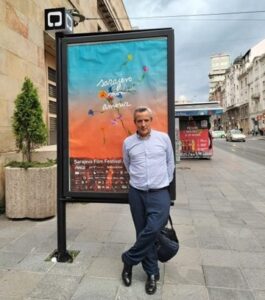
Magistrate Jorge Obach, mobilised in the framework of the EU4JUSTICE-Bosnia project In the case of BiH, the challenges are to “ensure the independence of the judiciary by avoiding political interference; guarantee the integrity of its members by complying with conflict of interest and asset declaration regulations; and promote the efficiency of the system, especially in investigating and prosecuting cases of corruption and organised crime,” says Obach.
According to García and Valdés, the challenges facing Albania include “the fight against corruption, the improvement of judicial independence and the efficiency of the judicial system, respect for the rule of law and fundamental rights, as well as the effective implementation of anti-crime measures”.
In the case of Serbia, Pizarro notes that these include “addressing the endemic problems of corruption in the country and strengthening the capacity of Serbian institutions to effectively investigate and prosecute organised crime cases and increasing the capacity to recover the proceeds of criminal activity”.
How are the projects supporting this accession?
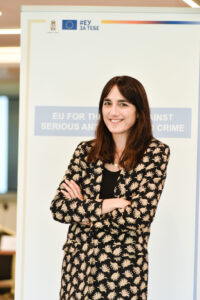
Senior Judge Marta Pizarro, mobilised in the framework of the EU4JUSTICE-Serbia project In Serbia, says Pizarro, “cooperation is carried out in a cross-cutting manner, involving all actors in the criminal process, from the police to members of the judiciary and prosecutors”. Among other actions, support is being given to Serbian institutions “in the design of legislative modifications to increase the efficiency of the legal and juridical framework, and to promote tools that improve coordination between the police, the prosecution and the judiciary”.
“The EU4Justice-Bosnia project is based on four pillars: ensuring the efficiency of the system, through activities carried out by Spanish specialists in which comparative analyses between EU and neighbouring countries have been provided; guaranteeing integrity, with actions aimed at ensuring the declaration of assets; promoting compliance with the regulation of conflicts of interest, with the participation of Spanish specialists in judicial ethics; and strengthening the quality and efficiency in the way of investigating and judging, especially in corruption cases, by providing specialised training”, says the magistrate posted to BiH.
In the case of Albania, Valdés and García explain that this is being done “through the training of civil servants, the exchange of best practices, the development of institutional capacities and economic support to implement reforms”.
What successful experiences of Spain’s EU accession process could be relevant for these countries?
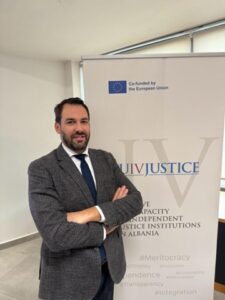
Spanish Magistrate Arturo Valdés, mobilised in the framework of the EU4JUSTICE-Albania project “The process of Spain’s accession to the EU accelerated the democratisation of the country, brought great social welfare, and strengthened the rule of law,” says Pizarro. “Already then, the foundations were laid for the creation of solid structures, which made it possible to progressively tackle the fight against corruption and organised crime in an efficient manner. In fact, the strength of the rule of law in Spain is highly valued by Serbian institutions as a relevant learning model”.
“It is very difficult to translate Spain’s pre-1985 status quo to present-day BiH. Spain’s success probably lay in the strength of its public administration being able (and willing) to absorb European regulation, with a quick adaptation of both internal regulations and procedures, as well as a good public awareness campaign on the advantages of EU membership. And probably because there was no other alternative,” says Justice Obach.
According to García and Valdés, some important lessons are “the importance of addressing structural reforms at the institutional and legal level, the need to promote political and social stability, as well as the commitment to the implementation of EU policies and regulations. The Spanish experience could inspire Albania to work on consolidating democracy, improving the rule of law and modernising its institutions”.
Why is international cooperation between public institutions relevant in this area?
In Obach’s view, “this is the only way to carry out any project, whatever the subject matter, effectively in any country. Only by sharing knowledge between the different public institutions and collaborating in accordance with the competences of each of them can an optimal result be achieved.
According to Valdés, “the EU seeks to ensure that candidate countries have transparent, independent and efficient judicial systems. Co-operation with public institutions in other countries facilitates the exchange of knowledge, best practices and experiences. Moreover, this collaboration, especially in areas such as justice, contributes to strengthening institutional capacity and ensuring the consistent application of European standards in the judicial and legal field”.
Judge Pizarro adds that “it cannot be overlooked that international cooperation between public institutions is fundamental to address critical issues such as the effectiveness of the fight against organised crime, given its cross-border and global nature“.
-
|
31 August 2022
|Posteado en : Interview
Analysing and evaluating the results of public technical cooperation is a basic pillar for the correct development of any cooperation action. This is the commitment that is made at the beginning, during and at the end of a project: it is not only an obligation as part of our public sector, but it is also an exercise in responsibility to evaluate the effectiveness of aid
We talk about this with Mario Germán Sánchez González, expert in monitoring and evaluation of cooperation programmes and project technician in the area of Justice and Rule of Law at the FIIAPP.
Why is it so important to measure results in public technical cooperation for development?
There is a global consensus outlined for sustainable development, to which all cooperation actions must respond and contribute, seeking to increase the impact on the reduction of poverty and inequality and the improvement of public systems. In this field, defined, measurable and traceable results are a necessary starting and finishing point to achieve the desired impact.
We are talking about aid effectiveness and the commitments and progress of states in this area, but we are also talking about carrying out an exercise of responsibility in technical action and in the investment of the economic resources with which it is financed.
What is the importance of results in European cooperation?
Results orientation in cooperation programmes has become a hallmark of European cooperation. The European Union’s major regional programmes have been an example of progress in this area. The Directorate-General for International Partnerships is increasingly demanding the application of the results approach in programmes and projects.
Along these lines, in 2015 the European Union created the European Union International Cooperation and Development Results Framework (EURF) to align the results sought and financed by European cooperation with the 2030 Agenda.
Furthermore, in January 2022, a new revision has taken place in which the known results framework is renamed the Global Europe Results Framework (GERF), which seeks to align with the 2020-2024 Strategic Plans of DGs INTPA, NEAR and FPI that were developed under the policy priority of a ‘Europe Stronger in the World’.
How do the results relate to the Development Assistance Committee (DAC) evaluation criteria?
The results, understood as guiding intervention guidelines, have a direct relationship with DAC evaluation criteria that are used to monitor and evaluate interventions.
The results of the intervention, in their different stages, are the object and content of the evaluation criteria, whose report tells us, among other things, about the degrees of achievement, contribution and/or attribution of the results, their relevance, pertinence, coherence and impact.
What challenges and opportunities exist for the effective implementation of the results approach in cooperation?
The main challenge, but at the same time an opportunity, is to be convinced that it can and should be applied throughout the project cycle, starting with the formulation itself.
It is a challenge because it requires a proper understanding of the results chain and its different links. At the same time, it is an opportunity, because it is an instrument we work with every day in cooperation projects, and if used correctly, it can lead not only to coherence, but also to the effectiveness of the intervention.
-
|
14 July 2022
|Posteado en : Interview
Este 11 de mayo la FIIAPP ha asumido la copresidencia de la Practitioners' Network, la red que engloba a la mayoría de agencias de cooperación europeas, junto a la agencia holandesa SNV. Hablamos con Mariana Fernández, coordinadora de la FIIAPP para la copresidencia, sobre los retos que se presentan en esta copresidencia y lo que supondrá para la FIIAPP.
Question: What is the Practitioners’ Network?
Answer: The Practitioners’ Network is an informal and voluntary network of European cooperation agencies accredited for delegated cooperation. In other words, we are agencies that implement cooperation projects financed by the European Union. This network was created in 2007 and currently has 22 members. It serves to pool all member agencies. In the end, we realize that, as we are dedicated to the same thing, we have common challenges to which we can look for solutions together, which is very useful for all of us and also allows us to foster a relationship of trust between agencies, as we are all regular partners in European Union projects. We often work together.
Q: Why is it important for FIIAPP to be part of this network?
A: At a strategic level for the daily work of the FIIAPP it is very important to be in this network and it is an opportunity because this network is a forum, a strategic and privileged platform for dialogue for the cooperation agencies, not only among the agencies as we were mentioning, but also vis-à-vis the European Commission, since it is an observer member of the network. Let’s say that it is a privileged space for exchange among us. In addition, as AECID is also a member, together we strengthen the position of Spanish cooperation in European cooperation, which at a strategic level is also very important for us and also allows us to give visibility to the work that FIIAPP does, especially our strengths or our areas of specialization. In the end, this helps us to position ourselves as an agency in issues that are a priority for us and in which we have experience and a lot to contribute.
Q: This 2022 is a very special year for FIIAPP in the network, because we are taking over the co-presidency together with the Dutch agency SNV…
A: Yes, the network has a rotating presidency and just this year we took over the presidency with the Dutch agency, which is called SNV. We started the chairmanship on May 11. This implies that we will have the representation of the Network before the European institutions, especially with the European Commission, which is very interesting because we will have the direct and periodic dialogue on behalf of the network with the Commission for a whole year.
In addition, the agencies that hold the Presidency convene and chair both the network’s governance meetings, as well as represent the network in major forums and events of interest, such as the European Development Days, as will be the COP 27 in November, or the Paris Peace Forum. In addition, the Presidency sets the annual priorities of the network, the issues on which all the agencies will work together in the Network forum and also has a special role in organizing activities and events. The presidency will be responsible for ensuring the strategic continuity of the network.
Q: What will be FIIAPP’s priorities for the co-presidency?
A: Within the general objective of developing and promoting the role of the NP as a key driver for strengthening better European development cooperation, this year we want to continue to emphasize at the European level the importance of cooperation agencies within the European development architecture. We also want to work on the operationalization of the Team Europe approach and the spirit of Working Better Together, of which we have been talking so much lately, since in the end we realize that the NP is the materialization of these two principles.
They are agencies that work together, looking for synergies according to their expertise in areas in which they have experience. It will also be especially important for the FIIAPP to continue to position the value of public sector knowledge or public technical cooperation, that is, the value of the knowledge of our administrations as a form of cooperation, since we are convinced of the importance of this cooperation for the improvement of public systems and the development of institutional capacities to provide services to citizens.
In short, this presidency is, of course, a challenge, but also an opportunity for us. We are delighted to be able to contribute in such a direct way to the construction of the European cooperation architecture. And we are looking forward to implementing the work plan that we have prepared and that we believe will be of great added value, not only for the agencies of the network but also for the citizens.
-
|
05 June 2022
|Posteado en : Interview
Indigenous peoples occupy 22% of the world's territory and their role is essential for the maintenance of cultural diversity and biodiversity, according to UNESCO.
The nature managed by these communities is declining less rapidly than in other areas, as they work to protect the environment over the long term through sustainable use of biodiversity management and governance. However, they are the most affected by the effects of climate change.
The lands they manage account for 28% of the carbon stored in forests globally. Annually, they sequester an amount of CO2 equivalent, on average, to 30% of Brazil, Colombia, Mexico and Peru’s 2030 targets. These countries store 28% of the world’s carbon, but account for only 5.1% of global greenhouse gas emissions.
The latest report of the Intergovernmental Panel on Climate Change (IPCC) warns of the loss of ecosystems and the decrease in food production and access to food, which has led to an increase in malnutrition and has seriously affected the economy of these indigenous communities.
Climate policies have traditionally ignored the ancestral knowledge and wisdom of indigenous peoples, which is why 141 governments committed at COP26 in Glasgow to recognise the rights of these communities and their lands as a fundamental element in ending deforestation by 2030. Now Peru is launching an Indigenous Peoples’ Platform to address climate change.
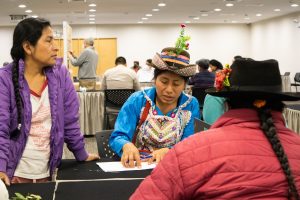
It thus becomes a pioneer country in the recognition of indigenous knowledge and practices that contribute to the comprehensive management of climate change, as established in the Paris Agreement.
FIIAPP supports this Platform
We spoke with Teresa Aguilar and Álvaro Ovejas, Project Technicians in the European programme Euroclima+, co-led by the FIIAPP, which has supported the formation of this Platform. They tell us about the challenges in the implementation of this proposal and the great benefits it brings. This is the first time that the Peruvian Ministries of Culture and Environment have come together with the country’s indigenous peoples.
How was the Platform of Indigenous Peoples of Peru born to confront climate change?
Teresa: This Platform was born out of the indigenous people’s own demand and brings together the seven registered and legalised indigenous organisations in the country. It is a milestone on the Latin American continent because it brings together indigenous peoples of different casuistry, ethnicities and origins.
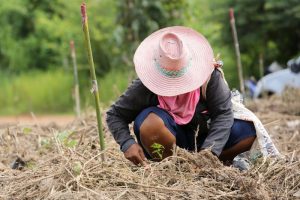
Álvaro: The Platform gives indigenous peoples a voice in climate governance bodies, such as the National Commission. In addition, Peru is a ratifier of ILO Convention 169, which establishes the obligation to consult indigenous peoples in all political and legal measures that could directly affect them.
What have been the main challenges in setting up this platform?
Teresa: The first challenge has been linguistic. The different indigenous peoples cannot understand each other, because not everyone speaks Spanish, only the political leaders. They speak five native languages such as Quechua, Aymara, Shipibo and Awajún. We have also faced the territorial challenge. It is not easy to move around in a country like Peru, and these are people who do not have access to digitalisation either.
How does climate change affect indigenous women the most?
Teresa: The indigenous population, because of their origin, is a rural population and their livelihoods depend on natural resources. Therefore, climate change directly affects their economic activity.
The impact of climate change is aggravated and is more disproportionate for women, who are already discriminated against and vulnerable. They are socially responsible for food and household health and, living in rural environments, their livelihoods are based on fishing, livestock, agriculture or agroforestry management. The impact of climate change degrades their economy, and we are already seeing climate migration in the face of environmental disasters caused by climate change.
What has been the role of the European programme Euroclima and the FIIAPP in the construction of the Platform?
Álvaro: Euroclima has been involved from the beginning of this process. It started with the prior consultation with indigenous peoples on the Framework Law on Climate Change, which agreed, among other provisions, on the creation of this Platform. It was during the development of the Framework Law on Climate Change that direct collaboration between Euroclima and the Peruvian Ministry of Environment began.
On the one hand, we have supported the development of dialogues between the Peruvian Ministry of Environment and national organisations. And on the other hand, we have supported the process of creating the entire legal, regulatory and institutional framework that gives the Platform its place.
Why are indigenous peoples known as guardians of diversity?
Álvaro: The way of life of indigenous peoples is not only very rural, but does not require the same infrastructure that is used in cities. Their routine is much more adapted to the environment.
Teresa: I think that the guardians of nature are undoubtedly the people who have originally grown up and lived in it. It is their ecosystem and they know it perfectly, it is what is called ancestral knowledge.
Is this initiative in Peru a reference for other Latin American countries?
Teresa: Peru is now a country that others look up to. There are countries that could replicate it because the Peruvian experience is scalable. All of Latin America has an indigenous population, but political will is needed. It all depends on the nature of the country and how this indigenous figure is received by governments.
There is also talk of indigenous associations at the regional level, such as those in the Amazon. The Amazon Basin has great value in terms of forests and the environment; it is the lungs of the planet and touches several countries. Therefore, we are no longer talking about a national platform, but a transnational one. When you talk to regional indigenous associations, their dream is to have a platform that unites them at the regional level.
-
|
09 May 2022
|Posteado en : Interview
These are turbulent times for Europe and for the world. But if there is one thing we have to celebrate on 9 May, it is the unity of the European Union in the face of adversity that threatens the pillars on which European values are built. A united Europe is a strong and resilient Europe. Silvia Prada, director of the FIIAPP's Brussels office, discusses the EU's new challenges, how it is managing them and what efforts it is making to position itself geopolitically at the global level.
Question: Looking back, with everything that has happened: the COVID crisis, the war in Ukraine… How is the EU handling the current global context?
Answer: The pandemic was one of the crises that pushed European integration forward. The pandemic was the high point because the EU managed to get member states to agree for the first time to borrow together to deal with the consequences of the socio-economic crisis caused by COVID.
In the external action dimension, the birth of “Team Europe” as a joint reaction of European cooperation actors to the needs of partner countries to address the pandemic and the exit from it. In line with the objective of the current Von der Leyen Commission: “A stronger Europe in the world” in the face of such a dramatic situation as the war in Ukraine, Europe, with the sanctions against Russia, has once again shown that unity in adversity, which is what defines and distinguishes it as a project and a space for consultation and regional integration.
Q: You mention that the current Commission has given the EU a more geopolitical focus, how has this affected development cooperation?
A: It has resulted in a paradigm shift from development cooperation to international partnerships, reflecting the change in the name of the Commission service from DG Development Cooperation to DG INTPA. It responds to the need to build international partnerships to leverage resources other than public resources to implement the 2030 Agenda and achieve its development goals. I think it is an opportunity to think about how these partnerships can be more strategic and how it can be an opportunity for the EU to project what distinguishes us, which are our values. This more geopolitical outlook also raises the level of cooperation policy and brings it closer to the EU’s external action priorities. I think this can be positive, as long as we do not lose the ultimate goal for which we work with our partners, which is to improve the lives of people and the planet.
The European Commission in Brussels on Europe Day
Q: It is precisely this holistic approach that is most reflected in the Team Europe logic, how would you define it?
A: As the joining of forces that can achieve more impact than if European actors work individually and in an uncoordinated way. I think it is showing the potential of our diversity as Europeans on the international stage, how we can be stronger if we join forces both in terms of talent from our administrations and from the private sector, the banking sector, civil society.
Q: In addition to this Team Europe strategy in recent months, there have been big projects and framework strategies such as the Global Gateway, but sometimes it feels like these documents don’t reach the people on the ground, what is the real impact of these documents on day-to-day life?
A: It is a framework, like a branding exercise. It is a strategy that we are moving towards together, and the big challenge is how to make it concrete and make it a reality without losing sight of the shared priorities with our partner countries. It is the joint look at how we want to achieve more impact to address challenges that we share with the other partner countries.
Q: What are the EU’s sectoral and geographical priorities for development cooperation?
At the geographical level we see that the region where the focus is clearest is sub-Saharan Africa and the neighbourhood, but Ukraine is also drawing attention to the importance of not losing sight of Latin America, which is our neighbour in every sense except geographically.
At the sectoral level, the two big priorities are the green and digital agenda. What COVID has taught us is that a just transition is needed, that the transition cannot only be green and digital but also has to be social, and although this part is not so marked, I think it is the distinctive feature of Europe, our social model.
Q: In all the work that the FIIAPP does in Brussels, one of the key areas is the Practitioners’ Network, what does this network consist of?
The Practitioners’ Network is an informal European network that brings together most of the European cooperation agencies. It has 15 years of experience, FIIAPP has been a member of the network for 8 years and will take over the co-presidency in May. It is the platform for strategic dialogue with the European Commission. It is a key space because it is where we can share realities that we encounter on a day-to-day basis in programmes and projects, it is the place where we can highlight the most relevant lessons learned when we work together and how we can improve in this regard. It is the platform where we can, from practice, and from our ideas, nourish the agenda of European cooperation, especially at this time of reflection or challenge to achieve coordinated joint work through the spirit of Team Europe and the new European development architecture that is under building, with the challenge of making it more structured and inclusive.
Q: The FIIAPP will take over the co-presidency in May. What are the priorities you intend to promote?
A: Above all, to promote the potential of the network as a guide for the incipient European development architecture or European cooperation system, coordinated and inclusive. How the network can contribute to the construction of a stronger narrative around Team Europe, as a milestone towards the construction of a European architecture for development, and how it can help us to reflect internally as agencies. Another issue is how it will be done: what are the methodologies and lessons learned from practice that can help us to work together in a more strategic, inclusive and participatory way, with the 2030 Agenda and its 17 SDGs as a frame of reference. In that sense, to continue work that has been of great added value, such as the reflection on the potential of public talent in our Member States, for a distinctive European cooperation around our values and interests.
-
|
10 March 2022
|Posteado en : Opinion
On February 24, the worst predictions were confirmed, also for the FIIAPP team in Ukraine, which has been working there since 2010. This has been reported in Computerworld
On February 24, the worst forecasts were confirmed, also for the FIIAPP team in Ukraine, which has been working there since 2010, currently with the projects “Strengthening the State Aviation Administration” and “Supporting e-Government and Digital Economy in Ukraine”.
Adrian Perez, from the EU4DigitalUA project, told the FIIAPP team that “we continue with our commitment and work to move forward with the project and thus contribute our bit to Ukrainian society”. So much so that Computerworld has echoed the importance of the European project co-led by the FIIAPP, and has talked to us about how the country’s digital future could be diminished after the tough situation in which it is immersed. Its manager, Pablo Ródenas, tells us about it.







